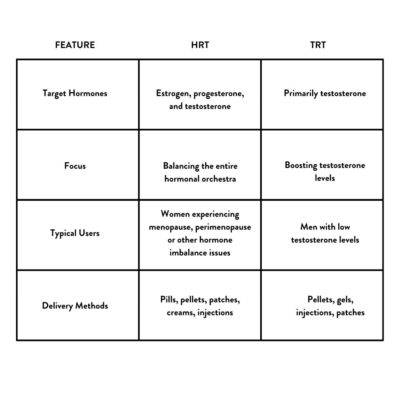
As an integrative healthcare provider, I often hear patients express confusion about hormone replacement therapy (HRT) and testosterone replacement therapy (TRT). While both involve replacing hormones, their targets and approaches differ significantly. Hence, HRT vs. TRT!
Let’s dive into the fascinating world of hormones, untangling the HRT vs. TRT dilemma and empowering you to make informed choices about your health.
What’s the Buzz About Hormones?
Hormones are like tiny chemical messengers, orchestrating a symphony of bodily functions. From regulating mood and metabolism to influencing sleep and sex drive, they play a crucial role in our well-being.
As we age, however, hormone levels naturally decline, leading to a cascade of changes for women and men entering menopause and andropause, respectively.
The imbalances that result from hormone level declines have a root cause impact on overall health, leaving many of us predisposed to a host of age-related chronic conditions.
HRT vs. TRT
HRT: Finding Balance for Women
Hormone replacement therapy focuses on restoring the balance of several key hormones in women, primarily estrogen, progesterone, and testosterone. Think of it as fine-tuning the entire orchestra, ensuring each instrument plays its part harmoniously.
Common issues that can be addressed by HRT:
- Relief from menopausal symptoms: Hot flashes, night sweats, vaginal dryness, and mood swings can significantly impact quality of life. HRT can effectively alleviate these symptoms and promote bone health.
- Management of chronic conditions: HRT can help manage conditions like osteoporosis, polycystic ovary syndrome (PCOS), and endometriosis.
TRT: Optimizing Levels for Peak Performance
TRT, on the other hand, is like boosting the volume of the lead singer – testosterone. It specifically targets low testosterone levels in men, which can lead to:
- Decreased libido and erectile dysfunction: A dip in testosterone can dampen sex drive and make achieving and maintaining an erection challenging.
- Loss of muscle mass and bone density: Testosterone plays a vital role in building and maintaining muscle mass and bone density. TRT can help prevent muscle loss and osteoporosis.
- Fatigue and low energy: Testosterone deficiency can zap your energy levels, leaving you feeling drained and unmotivated. TRT can help restore your zest for life.
The Key Differences: An Integrative Medicine Perspective
While both HRT and TRT address hormone imbalances, they differ in their scope and approach:
A Comprehensive and Integrative Approach to Hormone Health
As an integrative healthcare provider, I believe in a holistic approach to hormone health. This means addressing the hormonal imbalance, exploring the underlying causes, and supporting overall well-being. Here are some complementary lifestyle modifications to consider:
- A healthy diet, regular exercise, and stress management can significantly impact hormone levels and overall health.
- Certain vitamins and minerals can play a role in hormone production and metabolism. Identifying deficiencies and food sensitivities impacting absorption can be a leg up in arming your body with what it needs to perform optimally.
Remember, HRT and TRT are powerful tools but not magic bullets. Working with an expert in hormone replacement who can assess your needs and develop a personalized treatment plan is crucial to achieving optimal outcomes.
Don’t hesitate to ask questions and explore all your options to determine if hormone replacement is right for you.
By understanding the differences between HRT and TRT and adopting an integrative approach, you can confidently navigate the changes that come with aging and unlock a healthier, happier you.
Disclaimer: This blog post is for informational purposes only and should not be interpreted as medical advice. Please consult a qualified integrative healthcare professional before changing your diet, lifestyle, or medication regimen.

A Medical Director, and one of the first physicians to join the Nava Health & Vitality Center, Dr. Douglas Lord has made significant contributions to our Center and its founding principles. Dr. Lord has helped develop and implement the Nava Method™—Nava’s proprietary approach to total body wellness. He has also been instrumental in liaising with other expert practitioners to successfully implement Nava’s range of therapies, treatments, and products.
